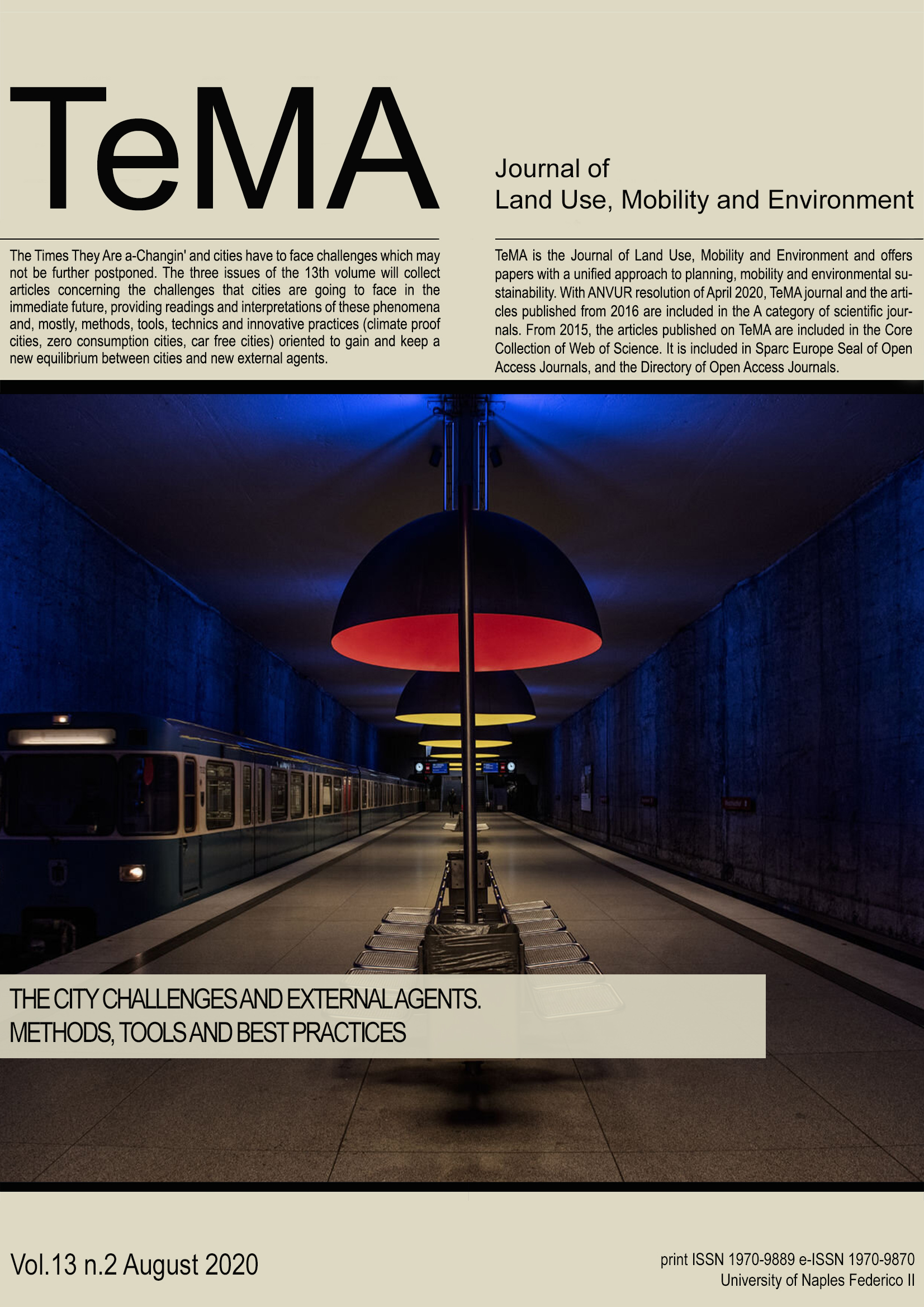After recovery: towards resilience
Abstract
Starting from the relationship between urban planning and mobility management, TeMA has gradually expanded the view of the covered topics, always remaining in the groove of rigorous scientific in-depth analysis. This section of the Journal, Review Notes, is the expression of a continuous updating of emerging topics concerning relationships between urban planning, mobility and environment, through a collection of short scientific papers written by young researchers. The Review Notes are made of five parts: Urban planning Literature Review; Town Planning International Rules and Legislation Overview; Urban Practices, Projects, and Innovative Approach; Framework of Scientific News and Events; Economy, Business and Land Use. Each of these sections examines a specific aspect of the broader information storage within the main interests of TeMA Journal. In particular, the Urban Planning Literature Review section aims at presenting recent books and journals, within global scientific panorama, on selected topics and issues. This contribution aims at discussing the main impacts and consequences of the Covid-19 pandemic on our lives and urban systems. While for the last issue of TeMA, this section of the journal was dedicated to the emergency phase, according to the new policy and strategic actions aimed at improving the coexistence of the new coronavirus within urban environments, this contribution is focused on how policy makers can enhance urban resilience, in sight of potential new health crisis.
Downloads
References
Brand, F. S., & Jax, K. (2007). Focusing the meaning (s) of resilience: resilience as a descriptive concept and a boundary object. Ecology and society, 12(1).
Errigo, M. F. (2018). The Adapting city. Resilience through water design in Rotterdam. TeMA-Journal of Land Use, Mobility and Environment, 11(1), 51-64. https://doi.org/10.6092/1970-9870/5402
Folke, C. (2006). Resilience: The emergence of a perspective for social–ecological systems analyses. Global environmental change, 16(3), 253-267. https://doi.org/10.1016/j.gloenvcha.2006.04.002
Gargiulo, C., & Lombardi, C. (2016). Urban retrofit and resilience: the challenge of energy efficiency and vulnerability. TeMA-Journal of Land Use, Mobility and Environment, 9(2), 137-162. https://doi.org/10.6092/1970-9870/3922
Holling, C. S. (1973). Resilience and stability of ecological systems. Annual review of ecology and systematics, 4(1), 1-23.
IPCC, (2019). Land: An IPCC Special Report on climate change, desertification, land degradation, sustainable land management, food security, and greenhouse gas fluxes in terrestrial ecosystems. 2019. In The approved Summary for Policymakers (SPM) was presented at a press conference on (Vol. 8). Retrieved at: https://www.ipcc.ch/srccl/
Matyas, D., & Pelling, M. (2015). Positioning resilience for 2015: the role of resistance, incremental adjustment and transformation in disaster risk management policy. Disasters, 39(s1), s1-s18. https://doi.org/10.1111/disa.12107
Mazzeo, G. (2018). Resilienza, circolarità, sostenibilità. Urbanistica Informazioni. Special Issue X Giornata di Studio INU “Crisi e rinascita delle città”, a cura di Franceco Domenico Moccia, Marichela Sepe, 272, 218-219.
McEvoy, D., Fünfgeld, H., & Bosomworth, K. (2013). Resilience and climate change adaptation: the importance of framing. Planning Practice & Research, 28(3), 280-293. https://doi.org/10.1080/02697459.2013.787710
Meerow, S., Newell, J. P., & Stults, M. (2016). Defining urban resilience: A review. Landscape and urban planning, 147, 38-49. https://doi.org/10.1016/j.landurbplan.2015.11.011
O'Hare, P. & White I. (2013). Deconstructing Resilience: Lessons from Planning Practice, Planning Practice & Research, 28:3, 275-279. https://doi.org/10.1080/02697459.2013.787721
Otto-Zimmermann, K. (Ed.). (2011). Resilient Cities: Cities and Adaptation to Climate Change-Proceedings of the Global Forum 2010 (Vol. 1). Springer Science & Business Media. https://doi.org/10.1007/978-94-007-0785-6
Pirlone, F., & Spadaro, I. (2020). The resilient city and adapting to the health emergency. TeMA-Journal of Land Use, Mobility and Environment, 305-314. https://doi.org/10.6092/1970-9870/6856
Rockefeller Foundation, 2019. 100 resilient cities initiative Rockefeller Foundation, New York (2019). Retrived at: http://www.100resilientcities.org
Rockefeller Foundation, 2020. Covid-19 National Testing & Tracing Action Plan. Rockefeller Foundation, New York (2020). Retrived at: https://www.rockefellerfoundation.org/national-covid-19-testing-and-tracing-action plan/?doing_wp_cron =1595887637.5233399868011474609375
Stumpp, E. M. (2013). New in town? On resilience and “Resilient Cities”. Cities, 32, 164-166. https://doi.org/10.1016/j.cities.2013.01.003
Walker, B., Holling, C. S., Carpenter, S. R., & Kinzig, A. (2004). Resilience, adaptability and transformability in social–ecological systems. Ecology and society, 9(2).
Zucaro, F., & Morosini, R. (2018). Sustainable land use and climate adaptation: a review of European local plans. TeMA Journal of Land Use, Mobility and Environment, 11(1), 7-26. https://doi.org/10.6092/1970-9870/5343
Carpentieri, G., & Favo, F. (2017). The End-use Electric Energy Consumption in Urban Areas: A GIS-based methodology. An application in the city of Naples. TeMA - Journal of Land Use, Mobility and Environment, 10(2), 139-156. https://doi.org/10.6092/1970-9870/5173
Copyright (c) 2020 TeMA - Journal of Land Use, Mobility and Environment

This work is licensed under a Creative Commons Attribution 4.0 International License.
Authors who publish in this journal agree to the following:
1. Authors retain the rights to their work and give in to the journal the right of first publication of the work simultaneously licensed under a Creative Commons License - Attribution that allows others to share the work indicating the authorship and the initial publication in this journal.
2. Authors can adhere to other agreements of non-exclusive license for the distribution of the published version of the work (ex. To deposit it in an institutional repository or to publish it in a monography), provided to indicate that the document was first published in this journal.
3. Authors can distribute their work online (ex. In institutional repositories or in their website) prior to and during the submission process, as it can lead to productive exchanges and it can increase the quotations of the published work (See The Effect of Open Access)

